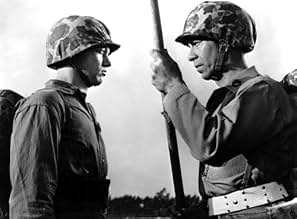The D.I.
- 1957
- 1h 46m
Ajouter une intrigue dans votre langueA no-nonsense drill instructor is convinced that he can make a recruit, who is haunted by his family combat history and who falters under pressure, into a Marine.A no-nonsense drill instructor is convinced that he can make a recruit, who is haunted by his family combat history and who falters under pressure, into a Marine.A no-nonsense drill instructor is convinced that he can make a recruit, who is haunted by his family combat history and who falters under pressure, into a Marine.
- Burt
- (as Matt Davis)
- Pvt. Casto
- (uncredited)
- S
- (uncredited)
- …
- Pfc. Hayes
- (uncredited)
- States
- (uncredited)
- Pvt. Labarsky
- (uncredited)
Histoire
Le saviez-vous
- AnecdotesMany real-life Marines are extras in the movie.
- GaffesMovie opens with wrongly punctuated close-up of a Marine plaque with the phrase "Let's be damned sure that no man's ghost will ever say - "If your training program had only done it's job." Correct punctuation is "its".
- Citations
TSgt Moore: You ain't gonna eat no bread, no corn, no pie, cake, desserts of any kind. No whole milk, no beans, no butter, no sugar, no potatoes, candy, ice cream, salad dressing or peanut butter... You came here with nothing but fat. You're gonna leave here with nothing but muscle.
- ConnexionsFeatured in JAG: Boot (1996)
- Bandes originales(If'n You Don't) Somebody Else Will
Music by Ray Conniff
Lyrics by Fred Weismantel
Sung by Monica Lewis
More than most, this movie is a product of its time period and its producer-director, Jack Webb. No one on screen was more in thrall to authority and authority figures than Webb, whether it be cops, DA's, or DI's, as is the case here. But then, his personality was well suited to play such authority figures.
Here, he's perfectly cast as the emotionally stifled drill sergeant. So, whether shouting commands or snarling insults, he's convincing to a rare degree for any Hollywood performer. On the other hand, the role's not likely to win him many female fans. For example, catch those softer scenes with Annie (Loughery); they're almost painful to watch. Nonetheless, it helps the movie that his macho character is, at least, willing to admit his difficulties.
The production itself amounts to an artifact of the 1950's. Overall, there's no hint of criticism of the military or its methods. After all, the country was coming off glorious victories in Europe and Asia, while the recent truce in Korea was more or less shoved under the rug. So, while we may chafe at some of Sgt. Moore's and the Marine Corps' harsh methods, we understand the purpose. At the same time, I think it's to Webb's credit that in no way does he try to make Moore likable. Of course, aspects of training, e.g. bad language, could not be shown because of the restrictive Production Code of the period.
Dealing with the narrative's problem character, Pvt. Owens (Dubbins), presented the screenwriter with a number of choices. He could have made him a mixed-up kid, a budding criminal, or a rebellious James Dean (as one reviewer astutely notes). Instead, writer Barrett makes what I think is a wise choice that resonates even in today's cultural climate. The kid's a quitter. He refuses to finish what he starts, whether it's professional schools or the Marines. Thus, without some kind of turnaround, he's headed for failure regardless of his life choices. Even so, Owens' eventual turnaround is a bit sudden and under-motivated given that he's insisted the discharge papers be put through.
Anyway, I like the way tradition is worked into the story with Pvt. Owens' mother (Gregg). Tradition is a large part of the military's mystique and here it is used in plausible fashion to keep Owens from washing out of training. (Note how director Webb has actor Webb suddenly become a mute bystander during Gregg's powerful scene. Even in the Dragnet series, Webb was willing to slide out of the spotlight when the drama warranted.)
Then there's the movie's centerpiece-- the hilarious sand flea burial. It registered with audiences of the time and, I expect, still does. It's a moment of comedic inspiration that also drives home its combat lesson. Note how the entire platoon is made to pay for one man's (Owens) mistake. That way, Owens' fellow trainees have as much stake in his conduct as the DI and thereby intensify the lesson. It may not be fair, but it is effective.
On the movie's downside-- did they have to make Moore so irresistible to women; then again, maybe it was the be-medaled uniform, which was considered a definite attraction at the time. That scene in the dress shop, however, with an over-weight and leering Barbara Pepper is hardly amusing and badly misjudged. Whatever Webb's assets as a moviemaker, he was no matinée idol, so those scenes are more than a stretch.
All in all, the movie's an interesting portrayal of Marine training for its time. Whatever the film's shortcomings, they're as much a part of the popular culture of the 50's as they are of the movie itself, and would only show up in such later training films as Tribes (1970) and Full Metal Jacket (1987). It's probably also telling that Webb's effort at reviving Dragnet (1967- 1970) in the face of the emerging counterculture failed to catch on with the original Dragnet's broad audience. Times had changed, and many younger folks were unwilling to accept an uncritical view of either authority or authority figures. Webb's time had passed, but the film's still worth watching for its important glimpse of the past.
- dougdoepke
- 3 févr. 2012
- Lien permanent
Meilleurs choix
- How long is The D.I.?Propulsé par Alexa
Détails
- Durée1 heure 46 minutes
- Couleur
- Rapport de forme
- 1.66 : 1
Contribuer à cette page





























